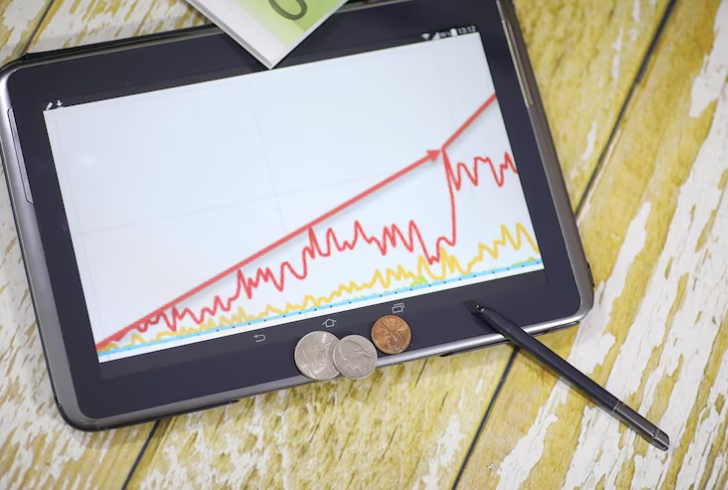In today’s discussion, we are focusing on a crisis that is causing some concern in the business sector: the recent shifts in the financial markets. While this isn't purely a tech story, it's closely tied to the tech giants’ stock declines, which have sparked widespread concern. The turbulence in financial markets has created uncertainty about the state of the economy. What should consumers and investors do in these uncertain times? To help make sense of this, I spoke with Jeanne Sahadi, a senior writer for CNN Business.
Jeanne has vast experience, covering everything from corporate leadership to personal finance. Recently, she addressed the concerns many of us face as we check our 401(k) balances, watching the market's decline.
The Shock of Recent Market Declines
Clare Duffy: "Jeanne, with all this volatility in the stock market, have you been checking your 401(k) more often?"
Jeanne Sahadi: "I try not to, but it's hard not to worry. Anyone paying attention would be anxious. Stock market drops, especially sudden ones like this, can be unsettling. Typically, there are gradual declines, but this was abrupt."
The past few weeks have been wild, with the stock market fluctuating, mostly trending down. On top of that, President Trump’s actions, including changes to major policies and tariffs, have created even more uncertainty. Can you explain what’s driving this?
Understanding the Uncertainty

Image by alexkich on freepik | Tariffs raise costs and hurt spending.
Jeanne Sahadi: "The biggest factor is the unpredictability stemming from President Trump's tariff policies. When tariffs were introduced, the scope was far larger than expected. Even the Federal Reserve, led by Jay Powell, didn’t foresee the immediate negative impact. Economists predict that these tariffs could lead to an economic slowdown while also driving up prices."
Clare Duffy: "So, the idea is that businesses importing goods will bear higher costs, which will eventually be passed on to consumers, right?"
Jeanne Sahadi: "Exactly. It's like a tax on everyone. It especially hits low-income consumers who rely on affordable goods imported from countries like China, Canada, and Mexico. But China is hit the hardest because it exports many inexpensive products that people have become very reliant on."
The tariffs aren't the only concern. There are also soft data points, such as consumer sentiment, which has taken a significant hit. This leads some to worry about a "vibecession," where the general mood about the economy leads to lower spending.
The Risk of a Downward Spiral
Clare Duffy: "Could the concern about the economy become a self-fulfilling prophecy? If people start spending less because they’re worried, that would only make things worse, right?"
Jeanne Sahadi: "That’s a valid concern. The economy thrives on consumer spending, and while spending numbers were solid recently, much of it might be due to people making purchases in anticipation of rising prices. If consumers start holding back, it could lead to a decline in economic activity, which in turn makes the situation worse."
The Recession Dilemma
Clare Duffy: "We’ve started hearing the word 'recession' again. What’s your take? Are we headed toward one?"
Jeanne Sahadi: "It's hard to say definitively. Economists often debate whether we're in a recession until it's over, since there’s a committee at the National Bureau of Economic Research that officially declares it. But usually, when we experience a recession, it feels like it's already happening. People see the signs: job losses, reduced consumer spending, and companies lowering their earnings forecasts."
But what really complicates matters right now is the added worry of stagflation—a situation where economic growth slows, yet prices keep climbing. This could be made worse by the ongoing tariffs.
The Stagflation Concern
Clare Duffy: "So, stagflation means high inflation even when the economy is in a downturn. How does this play out in real terms?"
Jeanne Sahadi: "In a typical recession, prices drop due to reduced demand. But with tariffs in place, prices are likely to stay high because companies will pass along the costs. The Federal Reserve is particularly concerned about this. Usually, they lower rates during slowdowns to stimulate the economy, but if inflation is still high, they can't do both. They have to choose between addressing inflation or economic growth."
This puts the Federal Reserve in an unenviable position. As Jeanne explains, this type of uncertainty could prevent them from stabilizing the markets.
What Can Consumers Do?

Image by prostock-studioon freepik | Plan your retirement with the right balance.
In these volatile times, what steps can consumers take to protect themselves and their finances? Jeanne offers some advice on investing strategies during uncertain periods.
Jeanne Sahadi: "When the market drops, it can feel like a personal loss. However, it’s important to keep perspective. If you're investing over the long term, you will face market dips, but that also presents opportunities to buy at lower prices. A common strategy is dollar-cost averaging, where you invest smaller amounts regularly, which helps mitigate the risk of market fluctuations."
She also advises that a well-diversified portfolio—spread across stocks, bonds, and different sectors—can reduce risk. Even if you can’t predict which sectors will outperform, diversification helps balance out the volatility.
Clare Duffy: "What about within stocks? Should investors look at international stocks, or focus mostly on domestic companies?"
Jeanne Sahadi: "In 401(k)s, many people are already diversified through target-date funds, which automatically adjust based on age and retirement goals. However, it's important to have a mix of domestic and international stocks, especially as international stocks have outperformed U.S. stocks this year. Additionally, ensure that bonds in your portfolio are high quality, whether they’re government or corporate bonds."
The Road to Retirement
The approach to investment strategy also varies depending on your time horizon. If retirement is just a few years away, Jeanne advises staying focused on protecting the wealth you’ve built, rather than making risky moves to gain more.
Jeanne Sahadi: "Even if you’re nearing retirement, you still want to maintain some stock investments in your portfolio. A mix of stocks and bonds is essential for managing risk while ensuring growth over the long haul."
Finding Peace in Uncertainty
With all the unpredictability in the air, what can you do to secure your finances? The key is to stay informed, avoid panic, and focus on long-term strategies. Whether you’re a seasoned investor or new to the market, these tips can help you weather the storm and come out stronger on the other side.
As we navigate this uncertain landscape, it’s crucial to remain calm, stay informed, and ensure your financial foundation is solid.
